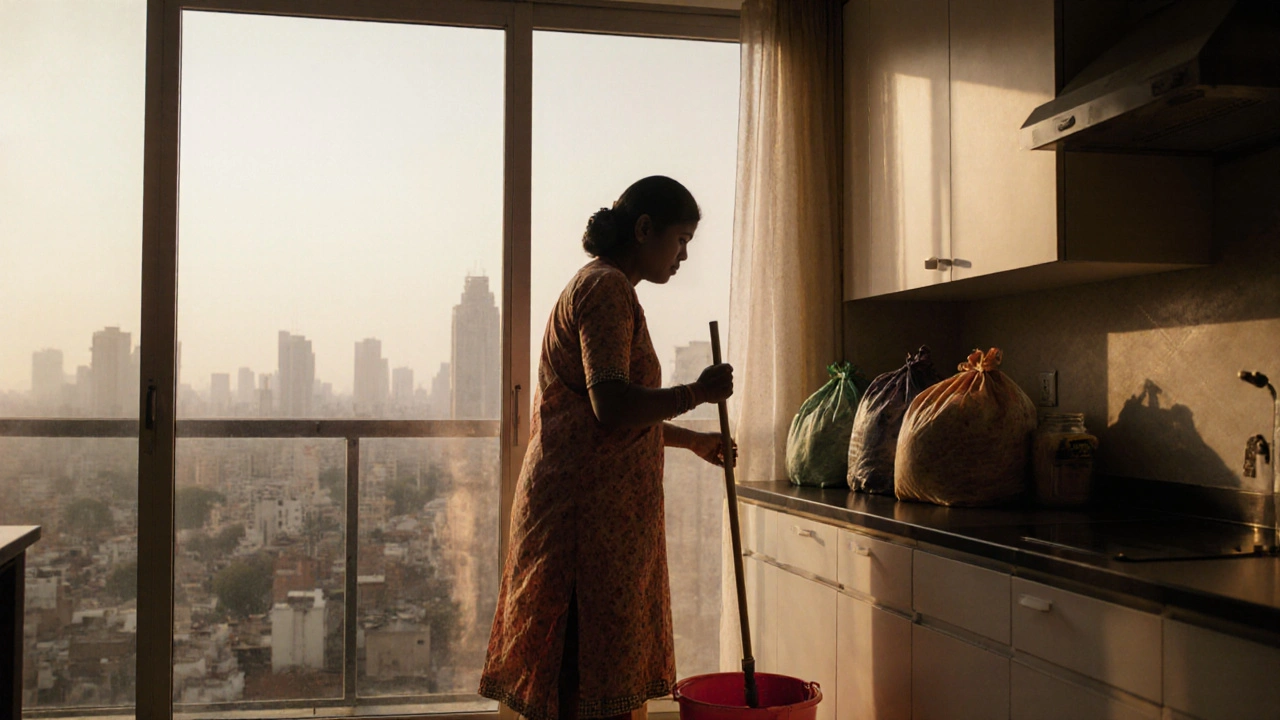What Is the Fee for Domestic Workers in Mumbai in 2025?
 Oct, 31 2025
Oct, 31 2025
When you’re hiring a domestic worker in Mumbai, the first question that comes to mind is: how much does it cost? It’s not just about finding someone reliable-it’s about paying fairly, legally, and without getting taken advantage of. In 2025, domestic worker fees in Mumbai vary widely depending on experience, duties, location, and whether the worker lives in or out. There’s no single fixed rate, but knowing the real numbers helps you avoid overpaying-or underpaying.
What Domestic Workers Actually Do in Mumbai
Domestic workers in Mumbai aren’t just maids. They’re often multitaskers: cleaning, cooking, laundry, grocery shopping, childcare, elder care, even pet care. Some work part-time, others live in full-time. The more duties, the higher the pay. A basic house cleaner might handle floors, dishes, and dusting. A full-time live-in helper might also cook three meals a day, wash clothes, and watch kids after school.Hourly Rates: Part-Time Domestic Workers
If you’re hiring someone for a few hours a day, say 4-6 hours, 4-5 days a week, you’re looking at hourly rates. In 2025, the average hourly wage for part-time domestic workers in Mumbai ranges from ₹80 to ₹150 per hour.- Basic cleaning (dusting, mopping): ₹80-₹100/hour
- Cooking + cleaning: ₹120-₹150/hour
- Specialized skills (baby care, elderly care): ₹150-₹200/hour
Monthly Salaries: Live-In Domestic Workers
Live-in domestic workers are the most common choice for families needing daily, full-time support. Their monthly pay includes food, accommodation, and a cash salary. In 2025, the average monthly salary for a live-in domestic worker in Mumbai is between ₹12,000 and ₹20,000.| Role | Monthly Salary (₹) | Typical Duties |
|---|---|---|
| Basic House Helper | ₹12,000-₹14,000 | Cleaning, laundry, light cooking |
| Cook + Helper | ₹15,000-₹17,000 | Full meal prep, cleaning, shopping |
| Live-In Nanny | ₹16,000-₹20,000 | Childcare, school runs, meals, light cleaning |
| Senior Care Attendant | ₹17,000-₹22,000 | Medication reminders, bathing, mobility support |
Workers with 5+ years of experience, language skills (English/Hindi), or certifications (like first aid or childcare training) often command the higher end of these ranges. Some families also offer bonuses for festivals like Diwali or Eid-typically ₹2,000 to ₹5,000-as a goodwill gesture.
What’s Included in the Pay?
Many people assume the salary is all cash. But in live-in arrangements, food and accommodation are part of the package. That means the ₹15,000 you pay isn’t just cash-it’s cash + meals + a room. If you hire someone part-time, they’re responsible for their own meals and transport. That’s why hourly rates are lower than monthly salaries for live-in workers.Some employers also provide uniforms, toiletries, or phone allowances. While not required, these small perks build loyalty and reduce turnover. In Mumbai, domestic workers often move between homes frequently. A small gesture like a monthly transport allowance (₹500-₹1,000) can make a big difference in retention.

Legal Minimum Wage in Mumbai (2025)
Mumbai follows Maharashtra’s state labor laws for domestic workers. As of January 2025, the minimum wage for unskilled domestic workers is ₹11,500 per month for full-time work (6 days a week, 8-10 hours/day). This applies to live-in and live-out workers alike. Employers who pay below this are breaking the law.Skilled workers-those who cook, care for children, or handle elderly care-should earn more. The government doesn’t set a fixed rate for skilled roles, but most agencies and worker unions recommend a minimum of ₹14,000 for those with specialized skills.
Remember: paying below the minimum wage isn’t just unethical-it’s risky. In 2024, Maharashtra’s Labour Department cracked down on 217 households for underpaying domestic workers. Fines ranged from ₹10,000 to ₹50,000 per worker. It’s not worth the risk.
Where to Find Domestic Workers in Mumbai
You can hire through agencies, WhatsApp groups, local community boards, or referrals. Each has pros and cons.- Agencies (like Saathi, HouseJoy, or local Mumbai-based services): Charge a one-time fee of ₹1,500-₹5,000. They screen workers, provide ID verification, and offer replacement guarantees. Good for first-time employers.
- Referrals: Ask neighbors, friends, or your building’s security staff. Workers hired through trusted networks are often more reliable and cost 10-15% less because there’s no agency fee.
- WhatsApp groups: Many Mumbai suburbs have active domestic worker groups. You can post your needs and get direct replies. Be cautious-verify identities and ask for references.
Never hire someone without checking basic documents: Aadhaar card, proof of address, and a recent photo ID. Even if you’re hiring through a friend, a quick verification prevents future problems.
Common Mistakes to Avoid
- Paying in cash only: Keep a record-even a simple note in your phone-of what you pay and when. It helps in case of disputes.
- Assuming one person can do everything: A worker who cleans and cooks might not be trained to handle a toddler or an elderly person with mobility issues. Match the role to the skill.
- Not giving days off: By law, domestic workers are entitled to at least one day off per week. Many employers give Sunday off. Not doing this leads to burnout and high turnover.
- Delaying salary: Pay on the same day every month. Even one late payment can break trust.

How to Negotiate Fairly
Don’t start by offering the lowest possible amount. Instead, say: “I need someone for 6 days a week, 8 hours a day, to cook and clean. What would be a fair salary?” Let them name a number first. Most experienced workers know their worth.If they ask for ₹18,000 and you’re expecting ₹15,000, meet halfway. Offer ₹16,500 and add a one-time festival bonus. This shows you respect their work. Workers in Mumbai often have families to support back in villages. A fair wage isn’t charity-it’s basic dignity.
What to Do If You’re Overpaying or Underpaying
If you’re paying ₹25,000 for a basic cleaner, you’re likely overpaying. Check what others in your neighborhood pay. If you’re paying ₹9,000 for a live-in worker, you’re underpaying-and risking legal trouble.Use this simple rule: ₹14,000 is the floor for any live-in worker with basic skills. ₹18,000+ is standard for skilled roles. Anything below ₹11,500 is illegal. Anything above ₹22,000 is usually only for specialized care or bilingual nannies with certifications.
Final Thoughts: Pay Fairly, Keep It Legal
Domestic workers are the backbone of Mumbai households. They keep homes running so you can focus on work, kids, or rest. Paying them fairly isn’t just about ethics-it’s about building a stable, long-term relationship. A good worker who feels valued stays for years. A cheap one leaves after a month.Know the rates. Know the law. Pay on time. Respect their time. That’s how you hire the right person-and keep them.
What is the minimum salary for a domestic worker in Mumbai in 2025?
The legal minimum monthly salary for a full-time domestic worker in Mumbai is ₹11,500, as set by the Maharashtra government. This applies to workers who work 6 days a week, 8-10 hours per day. Skilled workers, such as those who cook or care for children or elderly, should earn at least ₹14,000-₹16,000.
How much should I pay a part-time maid in Mumbai?
For part-time work (4-6 hours, 4-5 days a week), expect to pay ₹80-₹150 per hour. Basic cleaning starts at ₹80-₹100/hour. If the worker also cooks, the rate goes up to ₹120-₹150/hour. Rates are higher in South Mumbai and Bandra.
Do I have to give a domestic worker a day off?
Yes. Under Maharashtra’s Domestic Workers Act, every domestic worker is entitled to at least one full day off per week. Most employers give Sunday off. Denying this can lead to complaints, legal action, or high turnover.
Is it better to hire through an agency or directly?
Agencies charge ₹1,500-₹5,000 upfront but screen workers and offer replacements if things don’t work out. Hiring directly through referrals is cheaper and often more reliable, but you must verify documents yourself. For first-time employers, agencies reduce risk.
Can I pay a domestic worker less if they don’t work full days?
Yes, but only if they’re hired as part-time workers. For live-in workers, the monthly salary is fixed regardless of daily hours, as food and accommodation are included. For part-time workers, pay is calculated per hour. Never reduce pay for a live-in worker because they took a sick day-this violates labor norms.
Are tips or bonuses expected for domestic workers?
While not mandatory, it’s common practice to give a festival bonus-usually ₹2,000-₹5,000 during Diwali, Eid, or Christmas. Many employers also give a year-end bonus of one month’s salary. These gestures improve loyalty and reduce turnover.

Buddy Faith
November 5, 2025 AT 15:58Why are we even talking about wages like this is a grocery list
Next thing you know they’ll be demanding health insurance and a 401k
Who’s gonna pay for all this dignity
Just hire a robot already
mark nine
November 6, 2025 AT 18:08Real talk - if you’re paying less than ₹14k to someone who cooks and cleans daily, you’re not saving money
You’re just creating a ticking time bomb
Trust me, I’ve seen it happen
Scott Perlman
November 7, 2025 AT 18:03Pay fair and they stay
Pay cheap and they leave
It’s that simple
Eva Monhaut
November 8, 2025 AT 00:32The way this post breaks down the roles - basic helper vs nanny vs elder care - is actually really thoughtful
Too many people treat domestic work as interchangeable labor when it’s not
Someone who bathes an elderly person needs training, patience, and emotional resilience
That’s not just ‘cleaning’ - it’s care
And care deserves respect, not just a number
Sandi Johnson
November 8, 2025 AT 23:20Oh so now we’re treating domestic workers like CEOs with performance reviews and bonus structures
Next they’ll want a corner office and a company car
Just kidding
...kinda
Rakesh Kumar
November 10, 2025 AT 15:47Bro in Mumbai, even ₹18,000 is low if you’re in Andheri West
I know a woman who works 7 days a week, cooks for 3 families, and gets ₹16,000
She sends half her salary to her village for her kid’s school
She doesn’t complain
But you should feel guilty
And you should pay more
Thabo mangena
November 11, 2025 AT 11:34It is both a privilege and a profound responsibility to employ another human being in one’s household
The dignity afforded through equitable remuneration and consistent respect transcends mere economic transaction
It is the foundation of social cohesion
One must not reduce this relationship to mere cost-benefit analysis
It is, in truth, a covenant
Ronnie Kaye
November 13, 2025 AT 05:15Wait so if I pay ₹12k and give them chai every day I’m a saint?
Or is that just the bare minimum
Because honestly I’ve seen people who pay ₹20k and still treat them like ghosts
Wage isn’t the whole story
It’s the vibe
Xavier Lévesque
November 14, 2025 AT 18:20₹11,500 minimum wage
That’s less than my monthly Spotify subscription
And I don’t even like music
Yet somehow I’m expected to believe this is fair
Meanwhile my dog gets more attention than the woman who cleans my house
It’s not a salary crisis
It’s a moral crisis
Bill Castanier
November 15, 2025 AT 19:17Legal minimum is ₹11,500
But ethical minimum is ₹14,000
And generous is ₹18,000
Don’t confuse legality with morality
They’re not the same thing
Karl Fisher
November 17, 2025 AT 08:08Look I get it
But if you’re paying someone ₹20k to clean and cook
Are you sure you’re not just dating them
Or is this just a very expensive way to avoid doing laundry
Just asking
For science
Priyank Panchal
November 19, 2025 AT 06:10Stop pretending this is about fairness
It’s about control
They come from villages with no options
You know it
We all know it
So don’t act like you’re being generous when you’re just exploiting the gap
Pay what you can
But stop acting like you’re the hero
Tony Smith
November 20, 2025 AT 14:12It is imperative to recognize that the domestic worker is not an employee in the conventional sense
They are a member of the household
And as such, their welfare must be prioritized with the same gravity as one’s own family members
One must not merely comply with legal thresholds
One must exceed them
With grace
And without fanfare